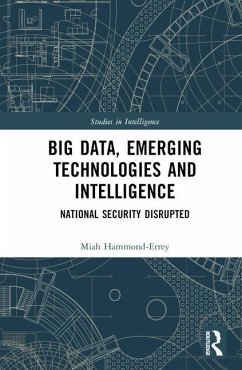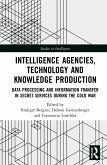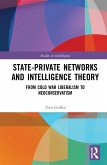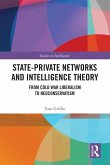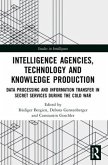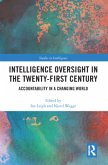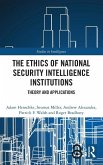This book sets out the big data landscape, comprising data abundance, digital connectivity and ubiquitous technology, and shows how the big data landscape and the emerging technologies it fuels are impacting national security.
This book illustrates that big data is transforming intelligence production as well as changing the national security environment broadly, including what is considered a part of national security as well as the relationships agencies have with the public. The book highlights the impact of big data on intelligence production and national security from the perspective of Australian national security leaders and practitioners, and the research is based on empirical data collection, with insights from nearly 50 participants from within Australia's National Intelligence Community. It argues that big data is transforming intelligence and national security and shows that the impacts of big data on the knowledge, activities and organisation of intelligence agencies is challenging some foundational intelligence principles, including the distinction between foreign and domestic intelligence collection. Furthermore, the book argues that big data has created emerging threats to national security; for example, it enables invasive targeting and surveillance, drives information warfare as well as social and political interference, and challenges the existing models of harm assessment used in national security. The book maps broad areas of change for intelligence agencies in the national security context and what they mean for intelligence communities, and explores how intelligence agencies look out to the rest of society, considering specific impacts relating to privacy, ethics and trust.
This book will be of much interest to students of intelligence studies, technology studies, national security and International Relations.
This book illustrates that big data is transforming intelligence production as well as changing the national security environment broadly, including what is considered a part of national security as well as the relationships agencies have with the public. The book highlights the impact of big data on intelligence production and national security from the perspective of Australian national security leaders and practitioners, and the research is based on empirical data collection, with insights from nearly 50 participants from within Australia's National Intelligence Community. It argues that big data is transforming intelligence and national security and shows that the impacts of big data on the knowledge, activities and organisation of intelligence agencies is challenging some foundational intelligence principles, including the distinction between foreign and domestic intelligence collection. Furthermore, the book argues that big data has created emerging threats to national security; for example, it enables invasive targeting and surveillance, drives information warfare as well as social and political interference, and challenges the existing models of harm assessment used in national security. The book maps broad areas of change for intelligence agencies in the national security context and what they mean for intelligence communities, and explores how intelligence agencies look out to the rest of society, considering specific impacts relating to privacy, ethics and trust.
This book will be of much interest to students of intelligence studies, technology studies, national security and International Relations.
'Drawing on substantial and exclusive access to the Australian Intelligence Community, this book provides a timely, detailed, and thorough analysis of the many ways in which big data is transforming intelligence and broader society. Dr Miah Hammond-Errey brings intelligence studies into the digital era with this original contribution to the scholarly field on intelligence and national security.'
Kira Vrist Rønn, Associate Professor, University of Southern Denmark
'With this book, Dr Hammond-Errey has produced a path-breaking empirical analysis of how Big Data is transforming intelligence and the challenges to which this transformation gives rise. Based on interviews with around 50 people working in and around the Australian National Intelligence Community, this book offers an invaluable guide to understanding the impact of the Big Data landscape on intelligence practice in liberal democracies and how this affects the intelligence-state-citizen relationship. It is essential reading for students of intelligence and for all those working in the field of intelligence, including its oversight.'
Mark Phythian, University of Leicester, UK
'This book is a timely account of the way big data and emerging technology have been disrupting intelligence and society. Dr Hammond-Errey develops an innovative framework of the landscape of big data that raises important questions about legitimacy and public trust in democratic institutions, the changing role of intelligence analysts, and the tendency to subject surveillance capabilities to greater democratic accountability.'
Christian Leuprecht, Royal Military College of Canada and Queen's University, Canada
Kira Vrist Rønn, Associate Professor, University of Southern Denmark
'With this book, Dr Hammond-Errey has produced a path-breaking empirical analysis of how Big Data is transforming intelligence and the challenges to which this transformation gives rise. Based on interviews with around 50 people working in and around the Australian National Intelligence Community, this book offers an invaluable guide to understanding the impact of the Big Data landscape on intelligence practice in liberal democracies and how this affects the intelligence-state-citizen relationship. It is essential reading for students of intelligence and for all those working in the field of intelligence, including its oversight.'
Mark Phythian, University of Leicester, UK
'This book is a timely account of the way big data and emerging technology have been disrupting intelligence and society. Dr Hammond-Errey develops an innovative framework of the landscape of big data that raises important questions about legitimacy and public trust in democratic institutions, the changing role of intelligence analysts, and the tendency to subject surveillance capabilities to greater democratic accountability.'
Christian Leuprecht, Royal Military College of Canada and Queen's University, Canada

